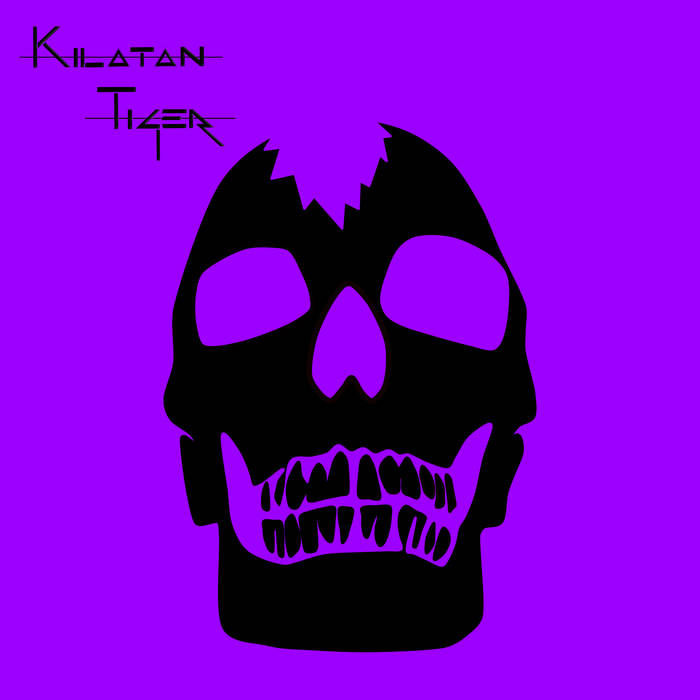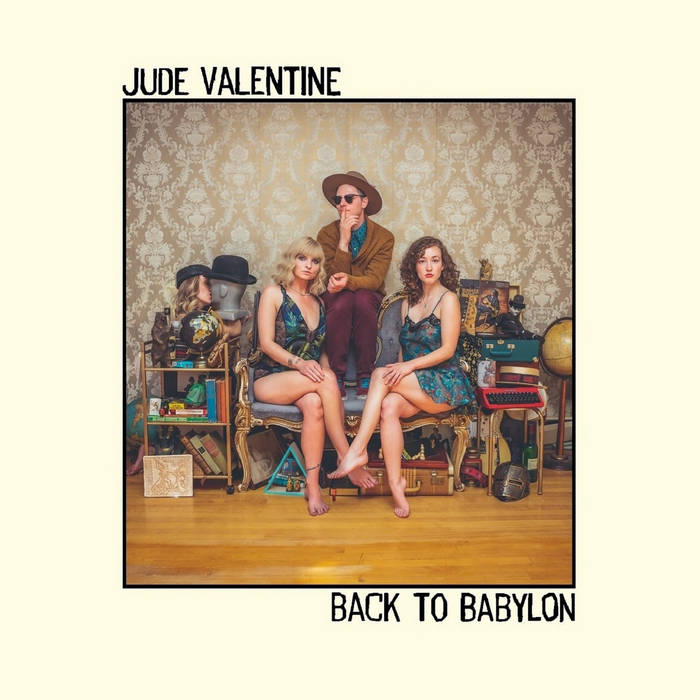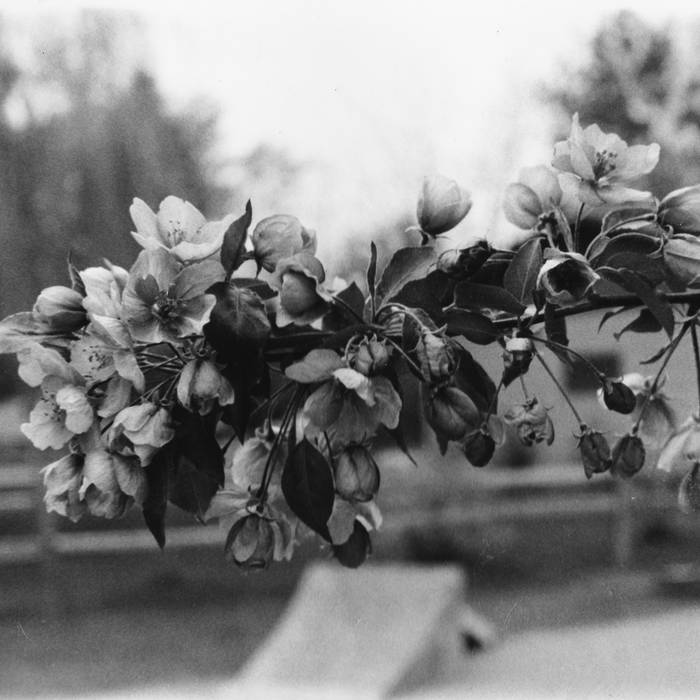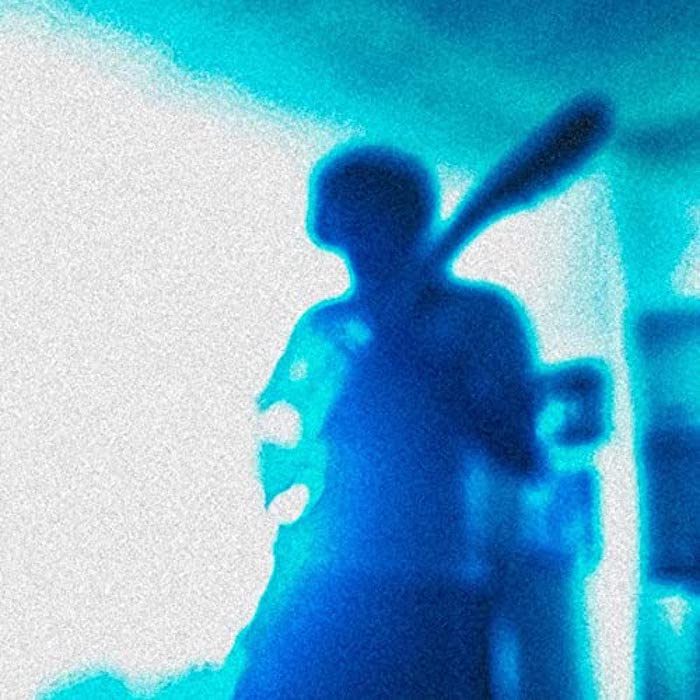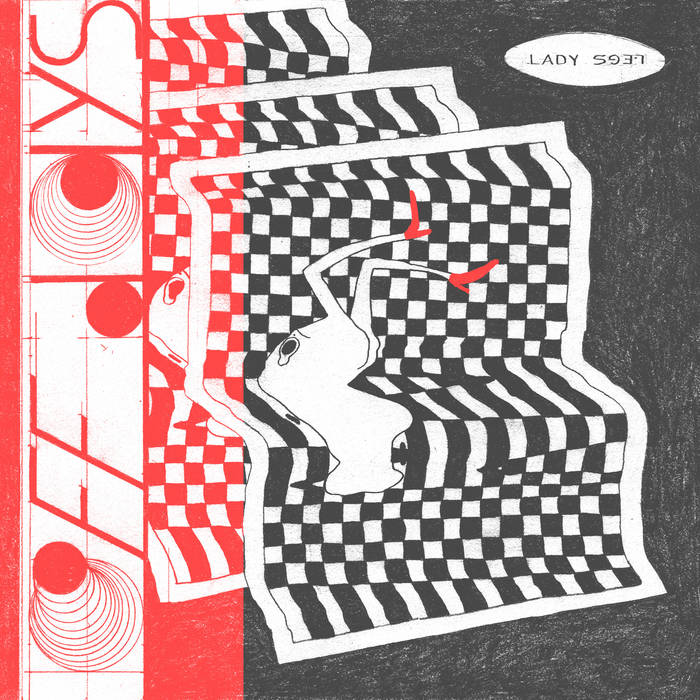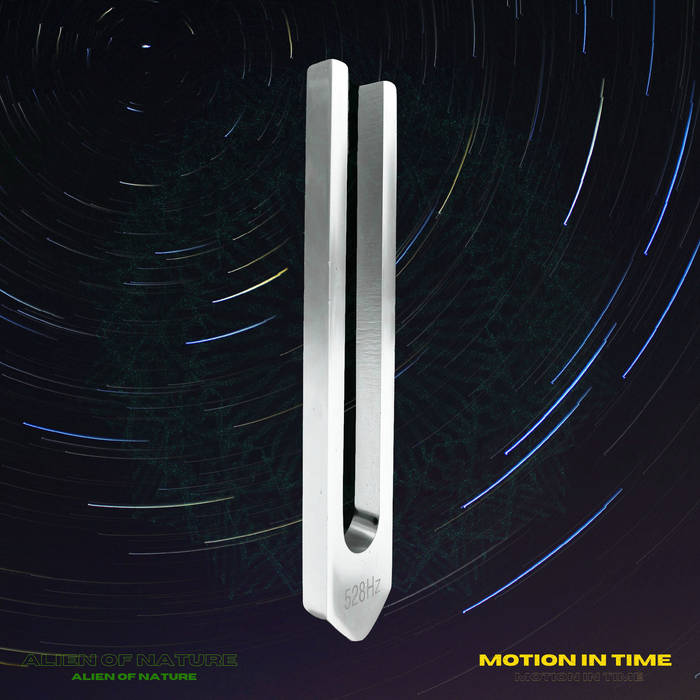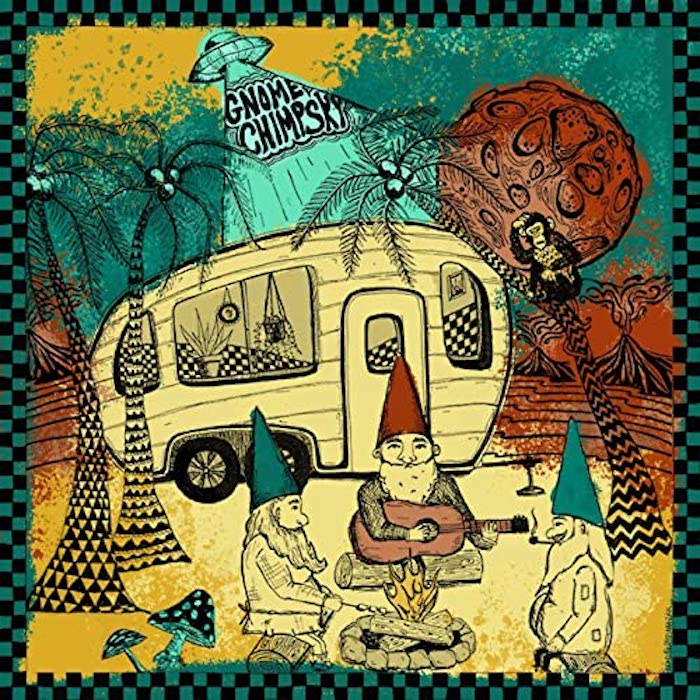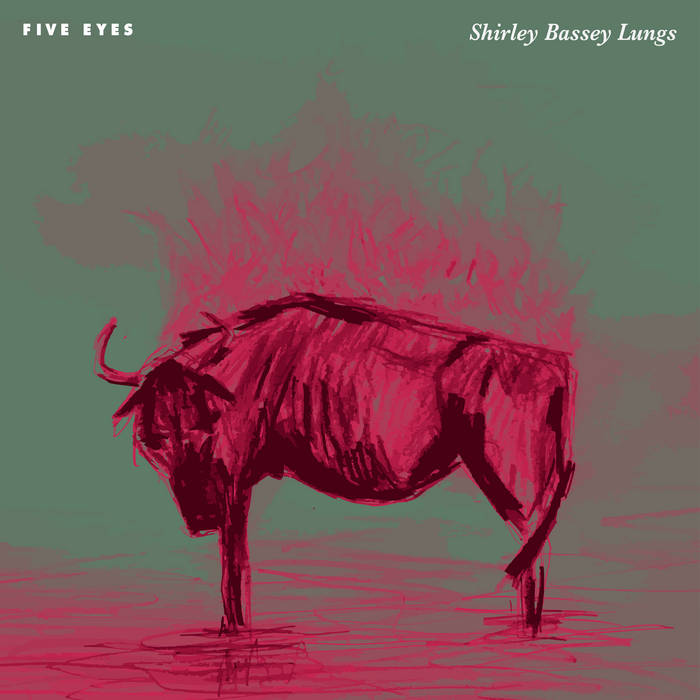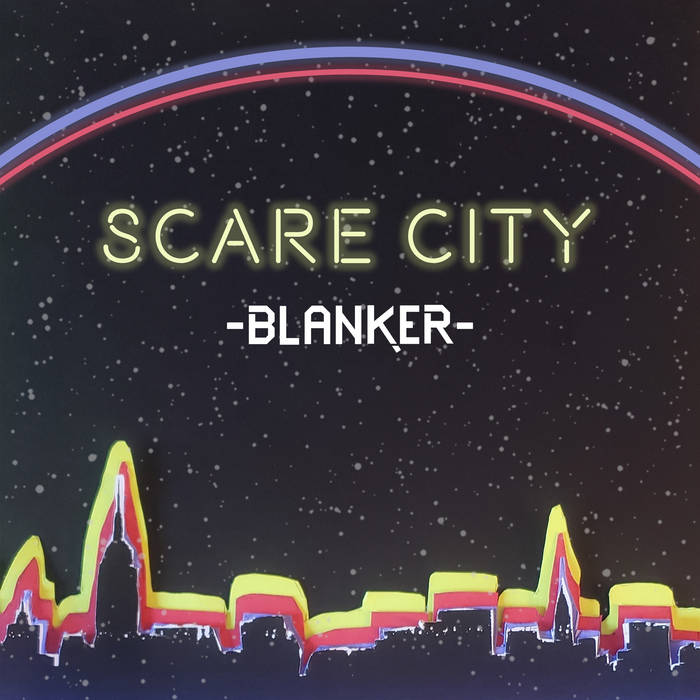|
Three songs from three guys: that’s the eponymous debut EP release from Glastonbury, England’s Kiloton Tiger. The band describes themselves as “conceived on a whim from the ashes of several older bands.”The trio found that they clicked, and started laying down the tracks that would become Kiloton Tiger.
The album sounds terrific--and it’s a home recording! The group used amp simulators for the guitar and bass tracks, combining simulators across multiple tracks to get “that unforgiving wall of sound,” as they call it. On top of this, drum sounds are samples. The only reason we know all of this is because Kiloton Tiger told us: it sure doesn’t sound like a software-driven set. They clearly know what they’re doing in the studio. Musically, the EP is heavy with tight, technical rhythm patterns locked in with heavy, riffing guitars. Prog-metal fans will feel at home here. A high point is the vocals, which shine throughout. Even better, the songs all have melody, which is very welcome in this genre of music. On top of this, Kiloton Tiger isn’t afraid of the occasional major chord, which serves to enhance the drama of the darker, more dissonant passages. The band makes good use of their studio skills throughout the set. A good example is the beginning of “Give Me The Night,” where clean guitars, swirling around drum parts, blend well against some evil distorted riffs. When the song turns heavy, the vocals cut through well. Yes, there’s melody, and some clean guitars, but let’s be clear: these guys are intense. “Hollow” is a double-bass-drum workout with riffs to spare. The band makes good use of the wah pedal for some fingers-flying solos, as you’d hope. “In The Way” kicks you in the face with its driving guitar parts. Call it melodic metal, if you like, but they get the job done. Kiloton Tiger tells us they have much more material to unleash on the world. Their debut collaboration is reason to be excited for it.
0 Comments
Jude Valentine is an indie singer-songwriter living at the Arizona-Mexico border in an old mining town called Bisbee. After performing around Arizona for over a decade, Valentine hit a rough patch in his songwriting: “I couldn't figure out how to write about how absurd and bombastic the world had become in a way that felt genuine.” Stuck inside during the pandemic, he became inspired to write and record most of the songs on Back to Babylon, which is available on CD or by download.
Valentine and drummer Raymond Alvarez recorded the basic tracks in a big open room using an old Tascam analog recorder and “whatever equipment was laying around the house. I decided to allow the music to be reflective of the angst and confusion of what was happening and allowed the instrumentation to match what the song meant within the narrative of the record.” Ranelle Mathews sings backup on a few tracks. To address the elephant in the room: it’s an obvious comparison, but Valentine truly does sound like Bob Dylan, and in many ways: vocal timbre, songwriting style, harmonica, studio sound and even organ (plus the album cover too!). The fact that this music comes from a much younger man than Dylan (his beard doesn’t fool me) is quite intriguing. As a Dylan fan I was comfortable with Valentine’s songs from the very first tune, “Waterloo,” which features a knowing, sly vocal with ringing guitars and Al Kooper-ish organ. The recording space feels HUGE with a wall of sound created more by natural reverb than overdubs. Using headphones, the stereo image seems to stretch way beyond one’s ears. “J. Robert Oppenheimer Blues” (quite a Dylanesque title!) slows things down for a spacey, almost spoken lament. “I could maybe love her / if it wasn’t for truth / This love is just a firing squad / Assigned for me to shoot.” It’s dramatic and intriguing with a luminous cloud of trilling high notes at the conclusion. “Relative Term” starts with a really nice bass and drum arrangement but then has Valentine’s vocals competing with overly loud and under-tuned guitars. “Baroness of New Babylon” returns us to solid ground with a fast-paced folk rock tune featuring ghostly organ and ethereal background vocals. The title track “Back To Babylon” is one of the best, an earnest and insistent narrative featuring some of the nicest chorus vocals. “Cities of Fire” takes a Johnny Cash rockabilly detour with a chugging train beat borrowed from “Ring Of Fire.” Love the twangy Fender-style guitars here. “Rebuilding Babylon” completes the “Babylon Trilogy” (unless you count the next song, which also mentions Babylon) for a slower, folkier narrative with spare instrumentation. “Draftee Jubilee” is a fun roots-rock rave up. “Cutting Epitaphs” is a more intimate performance centered on gentle guitar picking and vocals. “The ship is going down and they’re shooting off the flares / Even though they know that no one’s there / I’m laughing at the bow and drinking it straight / You know it’s finally something for which I don’t have to wait.” The final song “The Future Thine” has a majestic arrangement worthy of Blood On The Tracks. All of the thirteen songs here are lyrics-heavy, which puts me at a disadvantage since Valentine didn’t provide a libretto. I caught some of the words, but many others are swallowed by Valentine’s idiosyncratic phrasing. That said, I really enjoyed most of the music and the arrangements, and will be interested to see where Valentine goes from here.
Tyler Haag is a singer/songwriter from Minneapolis, MN. Eight years since his last release and four years since his last drink, Haag is now better than ever, returning with his latest EP Aim True. A departure from his twenties which were spent playing basement shows in punk bands and working in record stores, Haag moves his sound to simpler times with an acoustic and country-based vibe. Filled with brutally honest and candid lyrics, Haag brings his warm sound to audiences everywhere. After nearly a decade, Haag is back, giving audiences his reimaginings of Americana, rock and alt country packed with themes of “heartbreak, struggles with mental health and relationships.” Written and recorded in four months during the pandemic, you can feel the immediacy of the album throughout.
Aim True gets started with “The Best Breaks,” which starts off with some acoustic guitar and what sounds like the steel lap guitar. The sound felt very much in the vein of country and Americana. As Haag sings his heart out in this warm acoustic track, the strumming on the guitar slowly grows in mode. The trumpet adds another arresting layer to the acoustic vibes. Guitar and harmonica weaves together to give a very dynamic sound on “LPB.” Traces of the fiddle also make an appearance here. The big, soaring vocals feel very emotionally powered. I loved his overall performance on this song. Some beats set the pace on “Singing Baton Rouge” as the bluesy twang of the harmonica settles in the groove. This felt like an alternative/emo track with a country twist. I was touched by the vocal delivery. At moments this reminded me of Plain White T’s. More acoustic guitar highlights the sound on “Coffee Cold.” This is a simply rendered track with just guitar accompanying the vocals. This song felt very emo-inspired, packed with many flavorful instances. The quiet melody on display felt like a softer side to the artist. Off to a sauntering groove, the drums and harmonica comes in with a gritty, bluesy pulse on “Broadway At Night.” As the emo and punk-inspired vocals come in, there is no doubt of the country influences. On “Untitled Song,” more driven guitars make up the warm sound here. The emo vocals really add a deeper emotionally powered vibe to this song. Bouncy rhythms incorporate an Americana, country-bent appeal. On “Watch Documentaries” more acoustic guitar makes an appearance here. The tone just grows and grows in sound. Haag’s spirited country-bent vocals continue to serenade us on this dynamic ballad. Interwoven into the song are some female vocals that also includes a touch of drama to the sounds. More striking chord progressions on guitar adds a moody yet amped vibe to the start of “Sell My Coat, I’m Off To Heaven.” What sounds like an organ adds on some unique instrumentation. The combined vocal harmonies give off an energized layer to this track. The familiar country-bent sounds also make its way on this song. This felt like a great way to close the album. A home recording, there is no doubt that this EP compels with its Americana, country and acoustic sounds. What also immediately hits you are Haag’s singer/songwriter sensibilities that makes this recording feel intrinsic to the coffee shop ambiance and open mic vibes that often tags along whenever anything “singer/songwriter” comes up. But this by all means doesn’t have to be a bad thing. You can say that this just falls underneath a certain category of rock or acoustic rock. Mainly featuring guitars and vocals, the glaringly simplicity of this album allows bigger room for emotional resonance that then really heightens the drama and impactfulness to each composition. As Haag’s goal is to ‘aim true’ like his album moniker so vocally voices, I think this album is able to achieve just that as you can’t get anything more honest and homegrown than this. I look forward to seeing what’s next for this artist.
Lou Arreaga is a singer/songwriter from Los Angeles, CA, who recently released ROAD. The musician mentions: “The album was inspired by a solo road trip where much was contemplated on miles of highway. The album reflects my thoughts on life, love, existence.”
The album is a mix of rock and folk with a somewhat classic Americana vibe. “Face” is the opener and starts with drums and a solid guitar groove. It’s pretty catchy and also contains a decent amount of psychedelia. “Tell Me Something Good” is a little more classic rock with an attitude. The first song that really stuck out to me was the melancholy and sparse “A Hunger.” It’s a straightforward folk song but well delivered and emotive. “Want” lays into all the classic staples of Americana. It’s a tale of a guy waking up beside a glass of whiskey and is mixed with a lot of nostalgia and reflection. “Drive On” is more of a blues jam with a solid lead guitar. “The Way” is more another sparse stripped back song but more in the style of Pink Floyd but that might have just been because of the reverb. The mood is lifted up by the more energetic and driving “Reflection.” “Inside” is a tender, intimate and heartfelt tune while “Tired” is more of a rock ballad. Last up is a reflective closer entitled “Long.” As an engineer myself I thought the recording quality was solid for DIY. On that note I would love to hear some future recordings with some more fidelity. The writing and delivery was consistently good. I do think his sound was a bit broad and it was hard to pick up on a signature sound. The one thing I think I’d like to hear more of is an X-factor which really defines his work to him. I really enjoyed these songs. He’s a versatile artist who can rock and also find intimate moments that feel real and in the moment. Take a listen.
Out of Auburn, Alabama comes Lady Legs with its sophomore album Off Days, a 14-track record which explores a varied array of musical genres through a lyrical lens that ranges from acerbic observations to cheerful nihilism. Throughout Off Days, Lady Legs departs from the surf-rock tones of its past records in favor of post-punk, country and psychedelic fuzz. The four members of Lady Legs, John Sims (vocals/guitar), Grant Galtney (vocals/guitar), Seth Brown (vocals/bass) and Ellis Bernstein (drums), have been recording and performing together for nearly a decade, and Off Days is the band’s second full-length release through boutique label Communicating Vessels.
The first half of the album encapsulates the dejected doldrums of adulthood, a tone set by the opening track, “Quit Bringing Me Down,” a thrumming, uptempo anthem which acknowledges mundanity and stagnation while simultaneously trying to shake it off, exorcise it through thrumming guitars and an upbeat tempo, as Sims sings, “You haven’t changed a bit / You’re full of it.” The third track “Patience,” a song about scraping through to the end of the week, ambles alongside a laid-back kick-drum beat though contains an edge in the lyrics, “Keep your high hopes and I’ll keep my scapegoats.” Lady Legs’ old surf rock sound still shines through on certain tracks such as the revelatory number “Wasted Emotion,” the opening riff of which shimmers in surfy tones, and which closes out the first half of the album. The 44-minute album is divided into two halves by a 52-second mid-album track titled “Interlude” which features a tinny keyboard ditty, calling to mind a hand-cranked music box held closely to one’s ear. After its daydreamy echo fades out, Off Days launches into its second half, easing in with the understated track “Learning From Myself,” before making way for a punchier sound in the pop riffs of “Not Right,” and “Idle Hands.” The latter track stands out as a solid indie rock track with Sims’ vocals calling to mind Julian Casablancas, backed by cheery “ba ba ba”s despite lyrics such as “I can tell you’re just not well / By the look on your face / You’re going through hell” indicating a darker frame of mind. As the album progresses, tracks are more varied in both genre and mood, evident in “For You,” a sprawling, bluesy number which ruminates on anxiety in an unbalanced relationship. The last standout track on the album, “Thank You,” which features a pared-down guitar whose riffs again verge on the surfy, begins, “Well I wanted to be patient / But I lost my cool tonight.” Lady Legs employs spoken word at the end of this track as an accented voice shares observations on an “addiction to thinking,” noting that “Can’t stop thinking / Is like can’t stop drinking.” Off Days spans many moods that have become all too familiar since its conception and release, matching the highs and lows of this era in which there are so many days that feel “off,” making it, as the band calls it, “a suitable companion for these strange times.”
Alien of Nature is the recording project of solo artist Mike Baran of Northern California. His new album Motion In Time features songs mostly written during the pandemic and explores the “challenges and epiphanies” experienced during the lockdown.
Baran started constructing songs on Logic with two close friends at his Mom’s east coast home. However, through a series of fortuitous connections, Baran wound up recording the album at Little Radios and Bones and Wire studios in Minneapolis, with mixing at Sound Dweller in Denver and mastering at Resonant Mastering in Seattle. Though Baran plays most instruments, he is assisted by Richard Medek (drums), Canner Price (pedal steel), Dan Lawn (cello), Josh Misner (violin) and Patti King (backing vocals). Baran’s coproducer on the album was Chris Koza, who also helped bring the early songs together. “Don’t Be Afraid” starts off with a surprise, as the chords and instrumentation hint that this is going to be a remake of Linda Rondstadt’s “Different Drum.” However, it quickly veers into more original territory. Baran has a pleasing pop rock voice without drawing undo attention to himself, and it’s a voice especially tailored for harmonies. His arrangements do recall the pop ’60s with a foot in psychedelia. He doesn’t list it, but I could swear I could hear an electric autoharp in there somewhere, as well as a harpsichord. “Catch The Wind” is not the Donovan tune, but the vocals and guitars do recall the Beatles. The tracks here are purposely a bit distorted, recalling the garage rock classics of yore. Spacey lyrics include: “Catch The Wind / You're Not Alone / Feel The Frequency / The Miracle Tone / We Come So Far We Can Not Vacate Who We Are / Oh Listen To The Sound Of Distant Star.” “Slow Down” features all the hallmarks of Baran’s established style, but for me this song is not as good as the sum of its parts. “Canyonlands” begins with a lovely picked intro that’s soon bathed in sweet waves of Canner Price’s pedal steel. The lyrics are a bit new agey for me, but I love the rock-psychedelia groove that kicks in. The drum overdubs at the end delightfully recall the conclusion of the Beatles’ “I Am The Walrus,” a rich resource we’ve all stolen from. “I Know You Know” begins with the lush cello and violin of Dan Lawn and Josh Misner, sounding for all the world like a string quartet. Patti King joins Baran for some simple and lovely vocals, and Baran’s expression of faith at the end is sweet and unexpected. “Sunburst” sounds like another lost ’60s pop gem, especially with the (intentional?) chorus lyrics of “It’s a beautiful day.” Really nice acoustic guitar breaks here. “Ready To Ride” channels John Lennon with its descending piano chords, acoustic guitar and Ringo-like drums, though the vocal is a bit more Sir Paul. There’s even a mellotron sample, though nobody gets a keyboards credit on the album. “Undone” (yet another ’60s title!) has a purposely dark, off-key arrangement with Patti King sounding like Stevie Nicks or - even more appropriately - Melanie. The name “Trump” is never mentioned, but I sense some real anger here at the former Prez, written when he was still in power. A weird tune, but one of my favorites. “JrSr” is an acoustic tune with a country feel and a nice David Gilmour-style vocal. I had a lot of fun with these songs, though it was impossible not to play “Spot The Influence” while listening. A song like “What Are We Trying To Be” works on its own terms without sounding so obviously like someone else, and I’d love to see Baran internalize his influences and develop his own style further.
Gnome Chimpsky, a trio from Windsor, Ontario, released their debut EP Something to Hold Onto this January. The band draws inspiration from everything from rock and funk to reggae and blues to inform their sonic vibe on this eight-track album, which arrives after two year’s worth of single releases.
The three members of Gnome Chimpsky (Jonah Litt, Quinn Pickersgill and Derek Boissonneau), co-write their songs in a “jam-based” process, meaning that the band riffs together, starting with a chord progression or a vocal fragment melody, and then jams together until the song emerges, an exercise in which the songwriting power is not deferred to one member of the band but rather is a shared experience. Most of Something to Hold Onto was recorded in the band's DIY studio, however, the drums and mixing were done in Windsor’s Highland Studio, and the album was mastered by Beau Vallis. Select tracks are tinted with an underlying early aughts alternative sound, such as “I’m Fine,” whose lilting verses waft over a distorted, reverberating guitar which sounds almost as if it’s being played underwater. The song switches gears at the chorus, where power-pop chords jolt the track, as the tone of the vocals change from wallowing and contemplative to a more sardonic nature with the vocalist singing, “I play these songs / So she can dance / And I can pretend I’m fine,” reclaiming an edge for the track in a vein vaguely reminiscent of emo pop. The chorus repeats “I can pretend I’m fine,” several more times before the song lapses once again into its next verse, but the repetition of the phrase begins to show the cracks in the singer’s ability to shine it on and continue the song. The band plays around with a number of sounds, experimenting with bluesy guitar riffs in the chorus of “Slow,” which calls to mind late ‘90s Red Hot Chili Peppers, whom Gnome Chimpsky cites as an influence. A more beachy surf rock sound emerges in the upbeat “Where Did My Friends Go?” where both the instrumentation and song title explain why the band has been described as “deserted island vibes.” The first track of Something to Hold Onto, “Do As I Say,” whose chorus warns, “Do as I say / Not as I do,” has a post-grunge vibe, and subsequent lyrics, “Monkey see / Monkey do” tosses a little nod to the band’s primate-themed name. The band, which formed in 2019, spent most weekends pre-pandemic playing live shows in local Windsor venues. It is easy to imagine the nature of those shows to be much like the mood of the album -- animated and energetic, yet lightheartedly amusing.
Manchester, England quintet Five Eyes boasts members that played in Cyril Snear, Trojan Horse and Sphelm. For this group, and their debut release Shirley Bassey Lungs, the band (Mike McKnight, Freddie Baker, Nicholas Mark Roe, Tim Powell and Darryll Clarkson) tried to rein in some of their technical playing history, aiming for, as they tell us, “a rhythmic sensibility that’s less about wrong-footing the listener with math-rock flexing, and more about potent grooves and counterpoint.”
They’ve hit that mark with this EP. But don’t despair, math- and prog-rock fans: this isn’t a three-chords-only record. Each of the four songs has multiple sections and textures, and there’s plenty of technical, tight playing to slake your thirst. Generally, there’s always one part that’s anticipating the downbeat (the vocals in “Orwellian Sex Dreams” or the piano in “Double Barrel Cure”), which helps to propel the music, and gives the listener a sense of an odder meter than the band’s actually using. Melodically, Five Eyes has crafted purposefully accessible songs. They include repeated motifs and counterpoints, leaning a little towards pop in places. McKnight admits that he’s opened his ears to “much more melody and simplicity”, and it shows in the songwriting. It’s tough to walk the genre-crossover line, but Five Eyes does it here quite skillfully. Shirley Bassey Lungs would be a fine album to introduce math-rock to a pop-rock fan, and vice versa. “Nocebo,” for instance, starts as a slow soul ballad with breathy, almost falsetto vocals; later sections pick up the tempo and include hints of math-rock in the guitar figures. Or try “Orwellian Sex Dreams,” which is a trance-y, three-four-time in-your-face nightmare of a dream with a cracking drum pattern and keyboards that add just the right amount of extra tension. That track concludes with “to get to the truth, you gotta follow the money.” Political themes interweave throughout the lyrics. McKnight’s written: “In the absence of context it's easy to assume / The crumbling palace of / Democracy” and “They’ve made it easy for you to sell / Your double-barrel cure / Less liberty / More weaponry.” Interestingly, this was all written and recorded in 2019--this is not a 2020 reaction, but rather something longer-standing. The album concludes on a high note, though, as we’re encouraged to “dance with abandon.” Shirley Bassey Lungs is a well-done EP, and the band walks the line between technicality and pop beautifully. Breathe in deep and give it a spin!
Blanker has been the music outlet for John Norwood, the former front man of the New York City indie rock group Upstate Escape since its disbanding in 2014. Norwood performs all instrumentation and handles the engineering and production of his albums –Scare City is his third release. The album was recorded and mixed in a 500 square-foot Brooklyn apartment using an RME Babyface Pro and Reaper as the DAW. Mastering was done through LANDR (an online mastering service). Electric guitars and bass were recorded direct using AMT preamps. Norwood give his latest the descriptive tagline – “Five floors up and underground.” He also says that “there’s a certain irony to being stranded in a city whose singular most attractive quality – the endless opportunity for human interaction – abruptly becomes a liability.” This refers to the pandemic in early 2020. Norwood suddenly found himself relegated to a 500 square-foot, fifth-floor walk-up apartment in Brooklyn that he shares with his girlfriend.Scare City is inspired by the stripped-down experience of pandemic living, and with no access to a practice space or recording facility, Norwood found himself writing songs that were equal parts silly and heartfelt, surreal and literal.
Over the following year, he worked this collection of songs into what would become the album. Styles include alt rock and synth pop, staying true to Norwood’s DIY ethos. Although the album is unrefined and not at all polished, it more than makes up for with heart and creativity. “Vikings” opens up the album with a funky beat and modern-day lyrics about pillaging a city to watch it burn. Figuratively speaking that is. Heavy on the ride cymbal, and fuzz guitars - nice and crunchy. “Last In/First Out” has old school rock sensibilities, and a style that says late ‘70s/early ‘80s New York. Next is “Twenty-Three” – a lighter flavored, reggae like tune about a chance encounter with someone at a bar that never quite happened. “Lightpost” is a cool, mysterious, sounding tune. It’s got a soulful, smoky quality to it and some excellent guitar textures as well. “Nah” offers the listener a pop/indie rock style and an all too familiar scenario of not going to a party for various reasons – the time it starts is too late, it’s not my scene and it’s just overall lame. The next tune should give you a double take – “A Fool and His Data are Quickly Separated” clearly has punk influence. I wouldn’t say it’s like the traditional hard-core stuff. More like if early punk-ish Police paired up with a ‘90s thrash rock band. The next track is the album’s title. “Scare City” is another one of Blanker’s smooth and mysterious songs. The bass and guitar melody are fantastic – I loved it. The dynamic between the verses and chorus was the real highlight here. I would recommend listening to this one for sure. Next up is “Man O’ War” and it features an awesome bass to drum rhythm and an overall groovy vibe. Not sure what Norwood was saying lyrically, but I liked this one, too. “Wielders of the Company Card” is a humorous tune. I think the words either describe schmoozing with the higher ups in your company at some bar or catching up with old friends after they find out that you’ve “made it big.” A lot of business-y suit and tie talk imbedded here. The last track is “All Saints” and it offers some more great crunchy guitar action – heavy on the guitar. The words suggest turning one’s back on the church after discovering that religious traditions just are not working anymore. I would say overall, Blanker’s Scare City had a great cohesive style, showcasing some moodier old school sounds with newer modern ones. Despite the artist stating the album is “unrefined” – it fooled me, as I thought it was well produced.
Andreas Karperyd is a Swedish electronic musician who has been releasing sound works and creating music for stage and dance performances since the mid-1980’s under various aliases. Karperyd’s new release, GND (short for “Ground”) came about when he was diagnosed with cancer in 2016 and begin recording through four years of treatments. Thankfully he beat his cancer in 2020 and took the opportunity to edit his raw material into the album we have here.
Karperyd generally records his music live, then edits in the studio to create the final tracks. His liner notes state: “Mixing glitchy electronica with beats have become sort of (my) trademark and on this album (I) go full out with it, also pairing it with more ambient pieces, bringing in more piano and strings to the mix.” The album was mastered by Andreas Tillander, and is available for digital download and limited-edition vinyl. “The Well Defined Rules Of Uncertainty” introduces us to Karperyd’s music with sounds that should be painful to the ear but somehow are not: they resemble malfunctioning circuits or shortwave radio distortion but with cyclical, slowly evolving melodies. “The Desire To Invoke Balance With Our Eyes Closed” introduces acoustic piano unhurriedly looking for a theme, much like Brian Eno’s ambient works with the electronic garnishes floating around at the edges. Spooky yet beautiful. “Reminiscence Of Tar” is a 12-minute epic that immediately evokes the feeling of being stuck in tar and trying to pull free, then slowly stretches out with low frequency oscillations and more of those decaying-circuit effects. If one encountered a bog filled with tar in outer space, this is probably what it would sound like. Karperyd squeezes every last bit of juice from a melody that is mostly just two notes. “Failures And Small Observations” feels very much like traditional jazz compared to what’s come before. There’s a steady beat and a dark acoustic piano theme with the space sounds again acting as a Greek chorus at the edges. Halfway through, the piano sounds begin to deconstruct, and several overdubbed violin tracks compete for attention, carrying new melodies and also providing a scratchy bed for the piano. This is probably my favorite track thus far, as it contains all the best elements of the previous tracks in one package. “Experience Of Today Is The Prediction Of Tomorrow” begins dramatically like a movie soundtrack, then settles into an amiable, almost funky piano and electronic keyboard groove. “Common Ground” actually breaks out of the slower, spacey template for a quicker paced collection of electronic and melodic loops. Like the previous track, this one ups the level of invention by several degrees with all of Karperyd’s instruments taking their turn in the spotlight. “Music For Millionaires Without Conscience” features Christian Olsson on drum kit for what feels like a short, avant-jazz improv. “Mummification Of An Empire” brings the music full circle, again featuring simple acoustic piano melodies with spacey overdubs and buzzing ornamentation. Though the similarity of these tracks made them sometimes feel like one long recording broken into sections, there was enough going on here to keep my interest despite the inherent weirdness of Karperyd’s electronic palette. Challenging but ultimately rewarding! |
Critique/insightWe are dedicated to informing the public about the different types of independent music that is available for your listening pleasure as well as giving the artist a professional critique from a seasoned music geek. We critique a wide variety of niche genres like experimental, IDM, electronic, ambient, shoegaze and much more.
Are you one of our faithful visitors who enjoys our website? Like us on Facebook
Archives
July 2024
|

